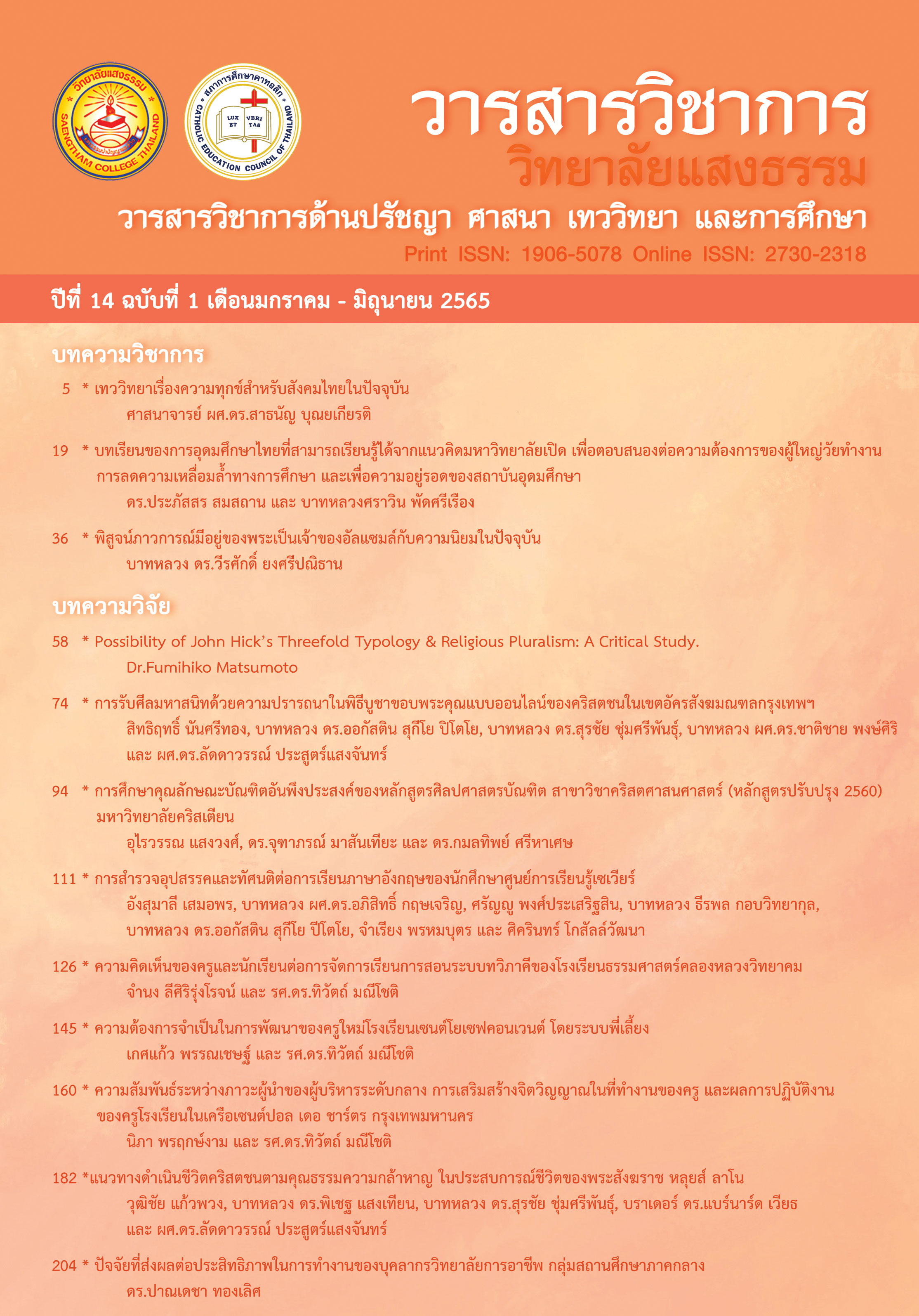Possibility of John Hick’s Threefold Typology & Religious Pluralism: A Critical Study.
Main Article Content
Abstract
A careful investigation on the concepts of Exclusivism, Inclusivism, and Religious Pluralism within a framework of Threefold Typology on soteriological grounds has shown some difficulties to achieve Hick’s mission for social development. That is to say, he strives to persuade fellow Christians to view the other world religions as equally authentic as Christianity and to enhance a peaceful co-existence with adherents of different religions and minimize religious conflicts in both community and global levels. Focusing on the philosophy of religion, theology of religions, and religious experience, this research explicates Kantian distinction between noumenon and phenomenon, Copernican revolution, the problem of conflicting truth-claims, epistemological accounts of faith. Hick’s criteriology to assess world religions and alternative approaches to Threefold Typology is also shown to analyze the strengths and shortcomings of Threefold Typology. By differentiating ‘self-committing-affirmation’ and ‘attitude and action,’ it revealed that Hick had placed some saintly figures in the category of Exclusivists and Inclusivists who should be praised and not be condemned by Hick’s own criteria. The research found the urgent need to analyze what Hick emphasized on soteriological grounds. After clarifying the arguments of impasse or deadlock of the Typology by other scholars, ‘teleological/existential grounds,’ which refer to the mere ‘transformation’ from self-centeredness to compassionate-centeredness as common potentialities to spiritually and morally grow as individuals, leaving aside ‘salvation’ controversy. The research concludes that the Threefold Typology on teleological/existential grounds becomes a more viable taxonomy to achieve Hick’s intention; the harmonious living with adherents of different world faiths and to direct ecumenical and inter-religious communications with mutual respect at both local and global levels.
Article Details

This work is licensed under a Creative Commons Attribution-NonCommercial-NoDerivatives 4.0 International License.
- The academic and research articles, as well as the content and opinions expressed therein, published in Saengtham College Journal are solely the responsibility of the respective author(s).
- Articles published in Saengtham College Journal are the property of Saengtham College. Reproduction, modification, or dissemination of all or part of the content in any form without written permission from Saengtham College is prohibited.
- Articles published in Saengtham College Journal are protected under the Copyright Act.
References
Abe, M. (1995). Buddhism and Interfaith Dialogue, Part One of a Two-Volume Sequel to Zen and Western Thought. University of Hawaii Press.
Barnes, M. (2002). Theology and the Dialogue of Religions. Cambridge University Press.
Berger, P. (2014). The Many Altars of Modernity: Toward a Paradigm for Religion in a Pluralist Age. De Gruyter.
Berger, P. & Luckmann, T. (1967). The Social Construction of Reality: A Treatise in the Sociology of Knowledge. Anchor.
Berger, P., Davie, G., & Fokas, E. (2008). Religious America, Secular Europe?: A Theme and Variations. Routledge.
Fredericks, J. (1999). Faith among Faiths: Christian Theology and Non-Christian Religions. Paulist Press.
Hick, J. (1988). Faith and Knowledge [1957] (2nd edition reissued with a new preface). Macmillan.
Hick, J. (1995). A Christian Theology of Religions: The Rainbow of Faiths. Westminster John Knox Press.
Hick, J. (2002). John Hick; An Autobiography. Oneworld Publications.
Hick, J. (2004). An Interpretation of Religion: Human Responses to the Transcendent [1989] (2nd edition). Yale University Press.
Hick, J. (2006). The New Frontier of Religion and Science: Religious Experience, Neuroscience and the Transcendent. Palgrave Macmillan.
Hick, J. et al. (1996). Four Views on Salvation in a Pluralistic World (Revised edition). Zondervan.
Nicholson, R. A. (1978). Rumi: Poet and Mystic [1950]. George Allen & Unwin.
Race, A. (1983). Christians and Religious Pluralism: Patterns in the Christian Theology of Religions. Orbis Books.
Schmidt-Leukel, P. (2005). “Exclusivism, Inclusivism, Pluralism.” In The Myth of Religious Superiority: Multi-Faith Exploration of Religious Pluralism. In Paul Knitter (Ed.), Orbis Books.
Spink, K. (2015). A Universal Heart: The Life and Vision of Brother Roger of Taize (Anniversary edition). SPCK Publishing.
Vatican Council II. (1965). Joint Catholic-Orthodox Declaration of His Holiness Pope VI and the Ecumenical Patriarch Athenagoras I. http://www.vatican. va/content/paul-vi/en/speeches/1965/documents/hf_p-vi_spe_19651207_common-declaration.html Accessed. 25th/March/2020
Valea, E. (2013). Buddhist-Christian Dialogue as Theological Exchange: An Orthodox Contribution to Comparative Theology. University of Wales International Baptist Theological Seminary, Prague, Czech Republic.


